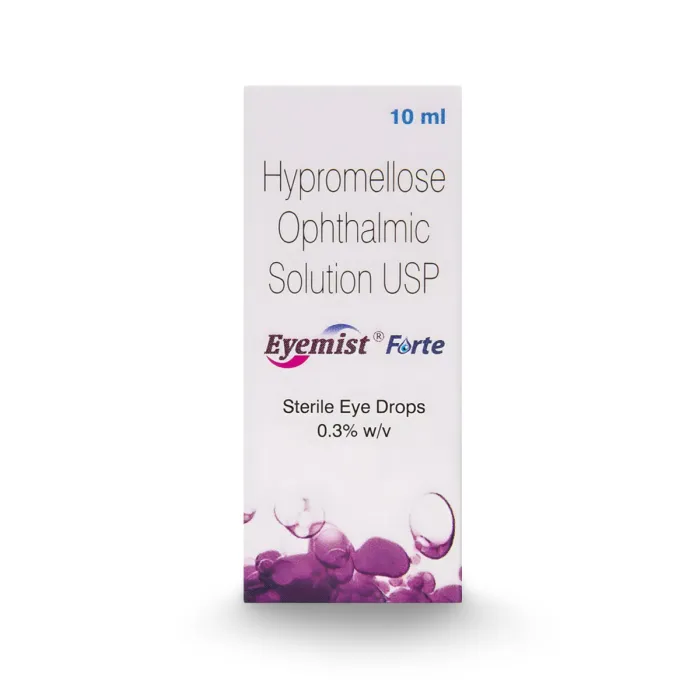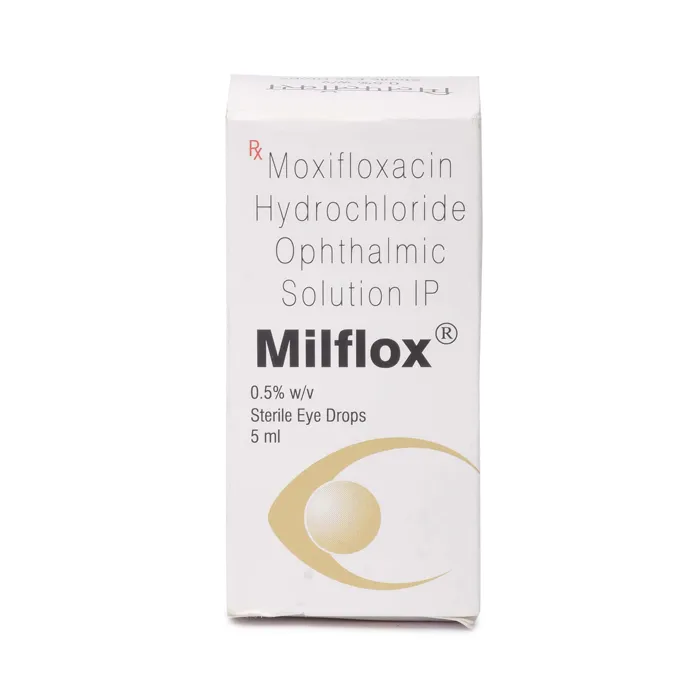Watery eyes, also known as Eiphora, can be uncomfortable and frustrating.
Understanding the underlying causes of watery eyes is crucial for effective management.
Several factors can trigger watery eyes, including allergies, Dry Eye Syndrome, etc.
This article will explore the causes, preventive measures, and treatments for watery eyes.
This comprehensive guide also discusses home remedies and the best eye drops for watery eyes.
Watery Eyes: Overview
Watery eyes occur when an excessive amount of tears is produced or when tears don’t drain properly.
Tears are important for maintaining the health of your eyes. However, when the balance of tears is disrupted, it can lead to discomfort and blurred vision.
By identifying the root causes, like allergies or dry eyes, you can take the necessary steps to find relief from watery eyes.
- Alerid 10 Mg (For allergic infections)
- Zaha Eye Drop 3 ml (For bacterial infection)
Save up to 90% on your medicine bills

Eyemist Forte 10 ml

Milflox 0.5% 5 ml

Restasis 0.05% Ophthalmic Emulsion

Pred Forte 10 ml
What Causes Watery Eyes
 Source: pixelshot
Source: pixelshotBefore we delve into watery eye treatment, it’s crucial to understand what causes this eye condition in the first place.
Several factors can lead to excessive tearing, like allergies, dry eyes, eye infections, etc.
Identifying the main cause is the first step toward effective treatment.
- Allergies: Allergic reactions to pollen, pet dander, dust, or certain foods can irritate the eyes, leading to excessive tearing. When your body reacts to allergens, histamines are released, causing watery eyes as one of the symptoms
- Dry Eye Syndrome: Dry eyes can also result in watery eyes. When the eyes are too dry, they can become irritated and respond by producing more tears. This can happen due to age, hormonal changes, or environmental conditions
- Blocked Tear Ducts: The tear drainage system can get blocked for various reasons, such as infections, injuries, or congenital abnormalities. This blockage can lead to tears not draining properly, causing them to spill over onto your cheeks
- Eye Irritants: Exposure to smoke, wind, or bright light can cause your eyes to water as a protective mechanism. These irritants can stimulate the production of tears to wash away foreign particles
- Eye Infections: Infections like Conjunctivitis (pink eye) can lead to watery eyes. In addition to excessive tearing, you may experience other symptoms like red eye and eye discharge
To learn more about the causes of watery eyes, read 5 Watery Eyes Causes You Must Be Aware of.
Watery Eyes Treatment
Depending on the underlying cause, you can try home remedies or eye drops.
Now that we have a better understanding of what causes watery eyes, it’s time to explore the treatment options available.
How to Stop Watery Eyes at Home
If you’re dealing with occasional watery eyes due to environmental factors or mild irritations, you may find relief through some simple home remedies:
- Warm compress: Applying a warm compress to closed eyelids can help open blocked oil glands and soothe irritated eyes. This can be especially effective for people with Meibomian Gland Dysfunction, a common cause of watery eyes
- Blink regularly: If you spend a lot of time in front of screens, remember to blink regularly. Staring at screens can reduce your natural blink rate, leading to dryness and watery eyes
- Stay hydrated: Dehydration can worsen dry eye symptoms, leading to watery eyes. Make sure you drink an adequate amount of water to keep your body and eyes hydrated
- Avoid allergens: If you suspect allergies are the cause, identify and avoid allergens that trigger your symptoms. Keeping your living space clean and using air purifiers can also help
- Humidifier: Using a humidifier in the home can add moisture to the air, which can help prevent dry eye symptoms that lead to watery eyes
- Tea bags: Applying warm tea bags to your closed eyelids can help soothe irritated eyes. Tannins present in tea have anti-inflammatory properties, which can relieve discomfort and reduce tearing.
To learn more about home remedies for watery eyes, read Clear Vision Solutions: How to Stop Watery Eyes at Home.
Best eye drops for watery eyes
 Source: stefanamer_from_Getty_Images
Source: stefanamer_from_Getty_ImagesWhen home remedies do not relieve watery eyes, you can turn to over-the-counter eye drops for watery eyes. Here are some of the best options available:
- Artificial Tears: Artificial tear drops can help lubricate the eyes and relieve the symptoms of watery eyes, especially when dryness is a contributing factor
- Antihistamine Eye Drops: If allergies are causing your watery eyes, antihistamine eye drops can relieve histamine release in the eyes
- Decongestant Eye Drops: Decongestant eye drops can temporarily reduce redness and eye irritation. However, they should be used sparingly, as prolonged use can lead to rebound redness
- Prescription Eye Drops: Sometimes, a doctor may prescribe stronger medications to address underlying causes of watery eyes, such as inflammation or infection. Follow your doctor’s recommendations carefully
To explore more treatment options, read “Watery Eyes Treatment: How to Treat Watery Eyes?“.
Conclusion
Watery eyes are a common ocular concern with various causes and effective treatments.
Watery eyes can be annoying, but understanding the causes and treatment options can help you get relief from watery eyes.
Whether it’s allergies, Dry Eye Syndrome, or blocked tear ducts, there are strategies to manage and relieve the symptoms.
If home remedies and over-the-counter eye drops don’t provide the relief you need, consult an eye care specialist.
They can diagnose the underlying cause of watery eyes and recommend a proper treatment plan.

Frequently Asked Questions
Can watery eyes be a sign of cancer?
Yes, watery eyes can be a symptom of certain eye cancers, although it is more commonly associated with benign conditions like allergies or irritants. Consulting a healthcare professional is advisable if concerned.
Are watery eyes and runny nose connected?
Yes, watery eyes and runny noses can be connected when allergies are the underlying cause. Identifying the root cause can help address both symptoms effectively.
Is watery eyes a symptom of COVID?
No, watery eyes are not typically a symptom of COVID-19. This viral infection is more commonly associated with respiratory symptoms and fever.
Are watery eyes healthy?
Yes, watery eyes are generally healthy, as they help protect and nourish the eyes. However, if tearing is excessive or persistent, it may indicate an underlying issue that a healthcare professional should evaluate.
Are watery eyes serious?
No, watery eyes are often not serious and can be caused by minor irritants or allergies. However, they can be symptoms of underlying conditions that a healthcare specialist should assess to rule out potential issues.
Cheap Medicine Shop only refers to credible, authoritative sources for our content. If you’re curious about how we ensure the integrity of our content, we encourage you to read our Content Information Policy.














